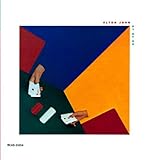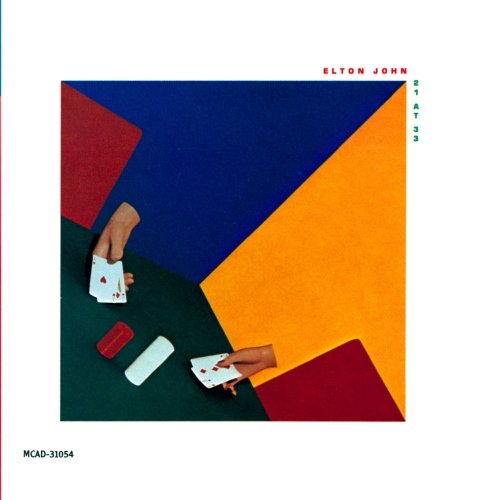Elton John Album: «21 At 33»

- Customers rating: (3.9 of 5)
- Title:21 At 33
- Release date:2013-03-25
- Type:Audio CD
- Label:Geffen
- UPC:076731105420
This product is manufactured on demand using CD-R recordable media. Amazon.com's standard return policy will apply.
Elton John, fresh off 1979's active year, with a top 10 hit (the Thom Bell written and produced "Mama Can't Buy You Love"), being one of the first ever rock artists to tour the Soviet Union (the Berlin Wall was still up) and blast through the speakers of discos across the country with the "Victim Of Love" album, opened the new 80's decade with his last album for MCA, "21 At 33". As most people know, the title refers to the number of albums released (21) and his age at the time (33).
With the first single "Little Jeannie" becoming one of his biggest hits of the decade, the album got off to a great start, backed with a solid tour as well. What one notices right from the start on this record is how clean sounding the production and the arrangements are. The bell-tree in "Little Jeannie" is crisp and crystal clear. The horn arrangement in the autobiographical "Two Rooms At The End Of The World" (Elton in London and Bernie in Los Angeles) is pointed and the staccatos have punch to them.
The second single, "Sartorial Eloquence" was a decent, building-ballad (although I've never understood why MCA released it as the key line from the song "Don't You Wanna Play This Game No More"). EJ & Taupin even (blushingly) take on (of all things) cocaine in "White Powder White Lady". All with the Eagles provided ample backing vocals (and perhaps, noses???). But the next two tracks could have been stronger. "Never Gonna Fall In Love Again", written with England Gay New-Waver Tom Robinson, was OK, but "Take Me Back", a country-esque number complete with "fiddle" was in retrospect too obvious of a "filler".
Much more interesting was the album's closing number "Give Me The Love" written with label-mate Judy Tzuke (think elements of Joni Mitchell and Kate Bush), who had a gorgeous hit the previous year with "Stay With Me Till Dawn". The song takes on a fluid, crisp jazz quality, one which was a head-turner for the hard-core Elton fan. It was so well written and executed, that I couldn't help but wonder if Elton was listening to Boz Scagg's "Middle Man" album while writing the music. It's always been my belief that Elton should do more exploration into Jazz, as well as compose and release an album of instrumentals. "Give Me The Love" seems to support both.
As with the other newly-released, import remasterings, they could have included some really great bonus tracks like "Conquor The Sun" (B-side to "Little Jeannie"), and "Cartier", "White Man Danger" (which should have been on the album instead of "Take Me Back"), as well as other european B-sides like "Love So Cold" and "Tactics". They really blew it...especially with most of the "Classic Year" remasterings containing bonus tracks.
Overall, "21 At 33" gets 3-Stars. It was a sprightly, Summery album, which would have gotton 4-stars if there would not have been the "filler" track mentioned above, as well as providing the bonus tracks mentioned. It should be noted that the remastering is superb and definetely enhances the clean, crisp arrangements.
This album is excellent. "Two rooms at the end of the world", which is about Elton John and Bernie Taupin reuniting, is worth the price of the album alone! All of the other songs are equally impressive, with the Rock&Roll beat of "Chasing the Crown", and the sad, yet slightly jumpy sound of "Satorial Eloquence".
"White Lady White Powder", an ode to cocaine, was written about the beginning of Elton's cocaine addiction and features Glen Frey and Don Henly of The Eagles, among others, singing back-up vocals and is guaranteed to be a sing-a-long favourite.
"Give me the love", written by Judie Tzuke, is an excellent track with superb piano, clear and happy trumpets, and a jazzy disposition that is asking for love. This is easily one of the better tracks on "21 at 33".
All in all, an excellent album. From this reviewer's point-of-view, this is one of Elton's best of the early '80's.
Dr. Sloane Towns
"21 at 33", originally released in 1980, is not usually considered to be one of Elton John's best albums. More precisely, it seems to be viewed as something of a transitional record for Elton following his notorious and commercially disastrous disco album "Victim of Love".
That said, "21 at 33" is an incredibly impressive achievement. Despite the personal problems Elton was going through during this period, including his increasing drug dependency, absolutely none of the songs here fail to display Elton's superior knack for songcraft. In other words, there's simply not a weak song on the disc. And the production, by Elton and Clive Franks, is mostly very tasteful, and the performances are spirited.
Granted, Elton's reliance on other people to write the lyrics for his songs does give him a certain advantage in that he can focus solely on writing the music, and he can also use the lyrics he's been provided with as a vantage point for the type of song he's going to concoct. Bernie Taupin, following his songwriting absence on the previous two albums, returned here, co-writing three of the songs. Gary Osborne was also continuing to co-write songs with Elton, and there are additionally two co-writes from Tom Robinson, and one co-write from Judie Tzuke. The liner notes inform us that all of the songs here were written at the Cote d'Azur in Grasse, France in August of 1979, which inescapably brings to mind the thought that Elton can turn out great song after great song in his sleep--even if these tunes were all written quickly, they all seem carefully thought out musically, and none of them feel merely like album filler.
"Chasing The Crown" is a great, energetic album opener that rocks out quite nicely with super-cool guitar and piano licks. "Little Jeannie" is a supremely melodic ballad with a soaring chorus and an irresistible fade that's based on the instrumental intro. "Sartorial Eloquence" starts off with a lovely sequence of piano chords and again is splendidly melodic with an irresistibly catchy chorus. "Two Rooms At The End Of The World" is a toe-tappingly catchy horn-laden pop-rocker with neatly placed harmony vocals. The neatly-unpredictable "White Lady White Powder" is an extremely well-crafted and catchy uptempo pop-rocker. The 6/8 time "Dear God" is a gently-swaying, arrestingly tuneful ballad. "Never Gonna Fall In Love Again" is also a solid ballad with a nice sighing quality to it. "Take Me Back" is a fun, musically upbeat song that shows just how comfortable Elton is a country-western setting. The album ends with the absolutely infectious grooving soft-rocker "Give Me The Love": unbelievably catchy vocal melody; irresistible syncopation; great horn and string arrangements; a really fun, spirited Elton vocal delivery; and great Elton piano fills.
"21 at 33" is an album that you can absolutely play straight through. On the other hand, you might have a hard time doing that due to a temptation to play certain tracks two or three times in a row. With a nice variety to the songs, and so much catchiness, this is a really great and underrated album from Elton, and I really can't fathom how any fan wouldn't love it.
(P.S. Further demonstrating what a roll Elton was on at this time, there are at least a couple songs from the "21 at 33" sessions that didn't make the album. One is the fine ballad "Conquer the Sun" which appeared as a b-side for the "Little Jeannie" single. Another is the irresistibly funky "Lonely Boy" which appeared as a b-side to the single for "Who Wears These Shoes?" in 1984. It would have made this album even sweeter had these two songs been added here as bonus tracks--fans won't regret tracking them down.)
Hey, Massachusetts - your anti-EJ campaign isn't working. Haven't you heard - he's sold like 200 Million records. I bought 21 at 33 (by the way the title indicates how many cd's he had released by his 33rd birthday), and I found it to be quite entertaining. Not Captain Fantastic's best work, but still better than anything I normally hear on the radio. Some very fine tunes here.
For Elton fan's, things started to fall apart in 1978 with the release of A Single Man and busted at the seams with the abysmal "disco" album Victim of Love.
With 21 at 33, (titled such, amazingly, because it was Elton's 21st album, released at age 33) Elton began righting the ship. Bernie Taupin had returned, after a four year absence, to write some of the tracks. Thus, parts of the album had a more solid feel and were more consistent with what people expected from Elton John. Although Bernie wrote the lyrics to three tunes ("Chasing the Crown," "White Lady, White Powder," and "Two Rooms"), it was the song "Little Jeannie" written by Elton and Gary Osborne which hit the charts.
Taupin's "White Lady, White Powder" is a strong rocker. Another Taupin composition, "Two Rooms" has a great hook and provides a fantastic lyrical description of the relationship between Elton and Bernie. The title would later be used for a tribute album and accompanying video. "Sartorial Eloquence" (not written by Bernie)is one of the strongest cuts on the album, recalling an earlier sound and sporting an unbelievable backing vocal line-up (Glenn Frey, Don Henley, Toni Tenille, and Peter Noone).
Elton's core band from the 70s, Nigel Olsson, Dee Murray, and Davey Johnstone, was briefly reassembed for a few cuts, though it is the studio musicians (foremost among them Steve Lukather from Toto), who really stand out.
Overall, 21 at 33, is a scattered album which, nonetheless started Elton down the road to really coming back. The two subsequent albums (The Fox and Jump Up!) would suffer a similar lack of cohesiveness, though 1983's Too Low for Zero would put Elton back on top of his game and start his "second coming."

